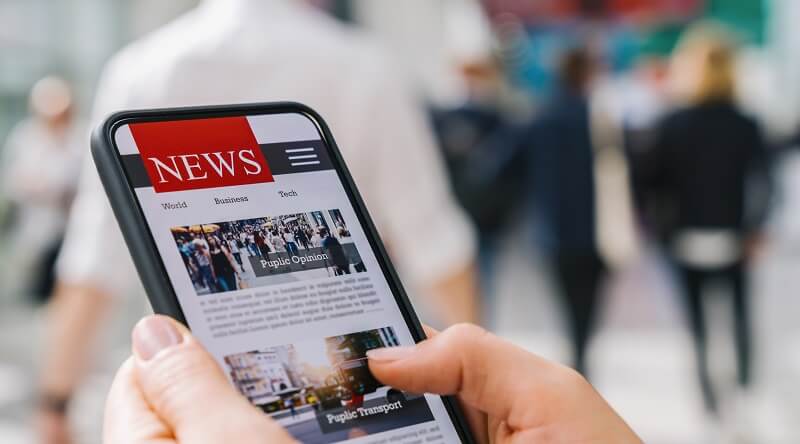Common Questions About stnews.live You Need to Read
The Significance of Fact-Checking worldwide of News Online
The prevalence of false information in today's on-line news landscape has reached startling degrees. Fact-checking companies play a vital duty in combating this fad. They confirm cases and improve the trustworthiness of journalism. Nonetheless, the effectiveness of these companies typically depends upon their approaches and public understanding. As target markets browse this complicated setting, the implications of their findings may form the future of news intake and trust fund. What does this mean for the integrity of info moving on?

The Rise of Misinformation in the Digital Age
Exactly how has the arrival of digital technology added to the spread of false information? The quick development of the web and social media sites systems has helped with the dissemination of information at an unprecedented speed. Customers can share posts, videos, and point of views with a simple click, frequently without validating the content's accuracy. Algorithms prioritize spectacular or emotionally charged product, causing a proliferation of deceptive narratives that catch attention.
In addition, the anonymity paid for by digital platforms allows individuals to spread out false details without liability (stnews.live). False information prospers in echo chambers, where customers are exposed mostly to point of views that enhance their ideas, even more entrenching frauds. The saturation of details can bewilder customers, making it challenging to recognize reputable sources from undependable ones. Misinformation has actually come to be a prevalent issue in the electronic landscape, impacting public point of view and depend on in legitimate news resources.
The Function of Fact-Checking Organizations
Fact-checking organizations play a crucial role in boosting the reputation of journalism by validating cases made in news reports. Their initiatives are vital in combating misinformation, making sure that accurate details dominates in the digital landscape. By holding media electrical outlets accountable, these organizations add substantially to notified public discussion.
Enhancing Trustworthiness in Journalism
While misinformation proliferates in the electronic age, fact-checking organizations play a necessary duty in improving the credibility of journalism. These organizations diligently verify cases made in news short articles, public declarations, and social media posts, guaranteeing that information distributed to the general public is exact and trustworthy. By supplying independent assessments, they serve as an important source for journalists, assisting them maintain high requirements of stability. Furthermore, their initiatives promote transparency in media, cultivating public count on. As audiences become progressively discerning, the visibility of trustworthy fact-checking entities can differentiate trusted news resources from those that might spread out falsehoods. Inevitably, the dedication of fact-checking companies to copyright truthfulness is crucial for the health of autonomous discussion.
Combating False Information Successfully
As misinformation remains to spread rapidly across digital platforms, the duty of fact-checking organizations comes to be significantly critical in the battle for exact details. These organizations act as watchdogs, inspecting insurance claims made by somebodies and media electrical outlets to guarantee responsibility. By employing extensive research study techniques and professional analysis, they validate realities and clarify deceptive narratives. Their searchings for are distributed through various channels, educating the general public and fostering crucial thinking. Furthermore, collaborations with social media sites platforms enhance their reach, enabling prompt flagging of incorrect info. As electronic literacy grows, the influence of fact-checking organizations is vital in empowering target markets to discern fact from falsehood, ultimately adding to a much more informed society.
Exactly How False Information Affects Public Understanding
False information greatly weakens count on media, leading audiences to wonder about the trustworthiness of news sources. Consequently, people often are attracted towards outlets that reinforce their existing ideas, adding to the polarization of point of views. This dynamic produces a fragmented info landscape, where shared understanding comes to be significantly hard to achieve.
Trust fund in Media

Count on media has actually become significantly delicate in the electronic age, where the quick spread of incorrect details can alter public perception. As misinformation proliferates across social networks and on-line systems, target markets frequently discover it testing to discern qualified resources from unreliable ones. This uncertainty promotes suspicion, leading several individuals to question the motives behind news coverage. Trust in developed media outlets has decreased, as consumers progressively transform to alternate resources that might lack extensive content requirements. This erosion of trust not only influences private ideas however likewise weakens the collective ability to take part in notified conversations. Eventually, the honesty of journalism is at risk, highlighting the vital demand for efficient fact-checking to recover self-confidence in the media landscape.

Polarization of Opinions
The increasing apprehension toward standard media has added to an expanding polarization of point of views among the general public. Misinformation, often disseminated with social media and on-line platforms, plays a significant function in forming unique ideological splits. Individuals often seek information that straightens with their pre-existing beliefs, reinforcing their point of views while rejecting opposing viewpoints. This echo chamber impact increases divisions, leading to a fragmented public discussion where agreement becomes progressively elusive. Furthermore, sensationalized narratives grow in this setting, further skewing public assumption and fostering wonder about in reliable sources. As polarization rises, the need for reliable fact-checking ends up being critical to connect spaces and promote notified conversations, eventually ensuring a much more cohesive culture efficient in navigating complex concerns.
Techniques for Effective Fact-Checking
Effective fact-checking counts on a methodical strategy that includes extensive research study, confirmation of sources, and crucial evaluation of claims. A foundational technique is cross-referencing info from several reputable sources to verify its precision. Fact-checkers often make use of specialized databases and archives to map the beginning of particular statements, guaranteeing that the reported details lines up with recorded evidence.
One more essential method entails scrutinizing the context in which insurance claims are presented. Misleading details can arise from out-of-context quotes or careful data use. By analyzing the broader narrative, fact-checkers can identify possible prejudices or false impressions.
Additionally, engaging with experts in appropriate areas can give clarity and insight that boosts the fact-checking procedure. This partnership can uncover subtleties that laypeople might ignore - stnews.live. Inevitably, a regimented method combining these methods cultivates a much more educated public, enhancing the dependability of information disseminated in the digital age
The Influence of Social Media on News Consumption
How has social media sites transformed the method individuals eat news? The appearance of platforms like Facebook, Twitter, and Instagram has significantly transformed news intake patterns. News is currently disseminated swiftly, permitting users to access real-time updates and involve with web content with sort, shares, and remarks. This immediacy has fostered a choice for bite-sized info, usually at the expense of extensive evaluation.
Social media enables customized news feeds, where algorithms curate content based on individual preferences, producing echo chambers that may limit exposure to varied viewpoints. The duty of conventional news electrical outlets has actually diminished as individuals progressively count on peer recommendations and trending topics. Consequently, the reliability of information is usually jeopardized, as sensationalism can overshadow factual coverage. On the whole, social networks has actually reshaped news consumption, emphasizing speed and customization while testing the standards of journalistic integrity.
Encouraging Target Markets to Recognize Trusted Resources

In addition, analyzing the authorship and business background of newspaper article can expose potential biases. Cross-referencing info throughout multiple trusted electrical outlets further enhances the confirmation process. Utilizing digital devices, such as browser extensions that rate the reputation of internet sites, can likewise aid in determining credible info. By actively involving with these resources and cultivating a vital attitude, audiences can better equip themselves to discern trustworthy news resources, ultimately fostering a much more informed society among the complexities these days's media environment.
The Future of Journalism and Fact-Checking
As the media landscape progresses, the future of journalism and fact-checking faces both tests and opportunities. The rise of electronic systems has democratized info dissemination, permitting varied voices to emerge. However, this has actually likewise caused the expansion of false information, requiring durable fact-checking mechanisms. Reporters will progressively count on modern technology, including AI devices, to validate realities rapidly and efficiently.
Cooperation between wire service and fact-checking entities is expected to strengthen reliability and transparency. Additionally, target market engagement will play an essential duty, as educated visitors come to be significant companions in identifying trustworthy web content.
The demand for liability and precision is likely to grow, pressing journalists to support high requirements in their coverage. Eventually, the future of journalism may depend upon its capability to adjust to technological improvements while preserving journalistic stability, guaranteeing that fact-checking stays a cornerstone of reputable news.
Regularly Asked Questions
Just How Can I Report Misinformation I Encounter Online?
To report false information come across online, people can use platform-specific reporting tools, supply clear proof, and share the info with fact-checking organizations. Involving with neighborhood discussions can also help elevate awareness concerning the misinformation.
What Prevail Indicators of Misinformation in News Articles?
Typical indicators of misinformation in newspaper article include mind-blowing headlines, lack of reputable sources, psychological language, irregular realities, and lack of writer qualifications. Viewers ought to critically examine content Source for these indicators to determine accuracy.
How Do Fact-Checkers Verify Resources?
Fact-checkers confirm resources by cross-referencing details with trustworthy data sources, speaking with professionals, and examining the original context of cases. They additionally analyze the dependability of the sources, ensuring accurate and trustworthy information for public consumption.
What Legal Actions Can Be Taken Versus Misinformation?
Lawful actions versus misinformation may consist of defamation legal actions, cease-and-desist orders, and governing fines. Victims can prosecute through civil courts, while some territories enforce penalties or sanctions on platforms sharing false details.
Are There Apps for Fact-Checking News On-The-Go?
Many applications exist for fact-checking news on-the-go, consisting of Snopes, FactCheck.org, and PolitiFact. These applications assist users verify cases quickly, promoting educated decision-making and fostering a more critical strategy to consuming news from this source in real-time.